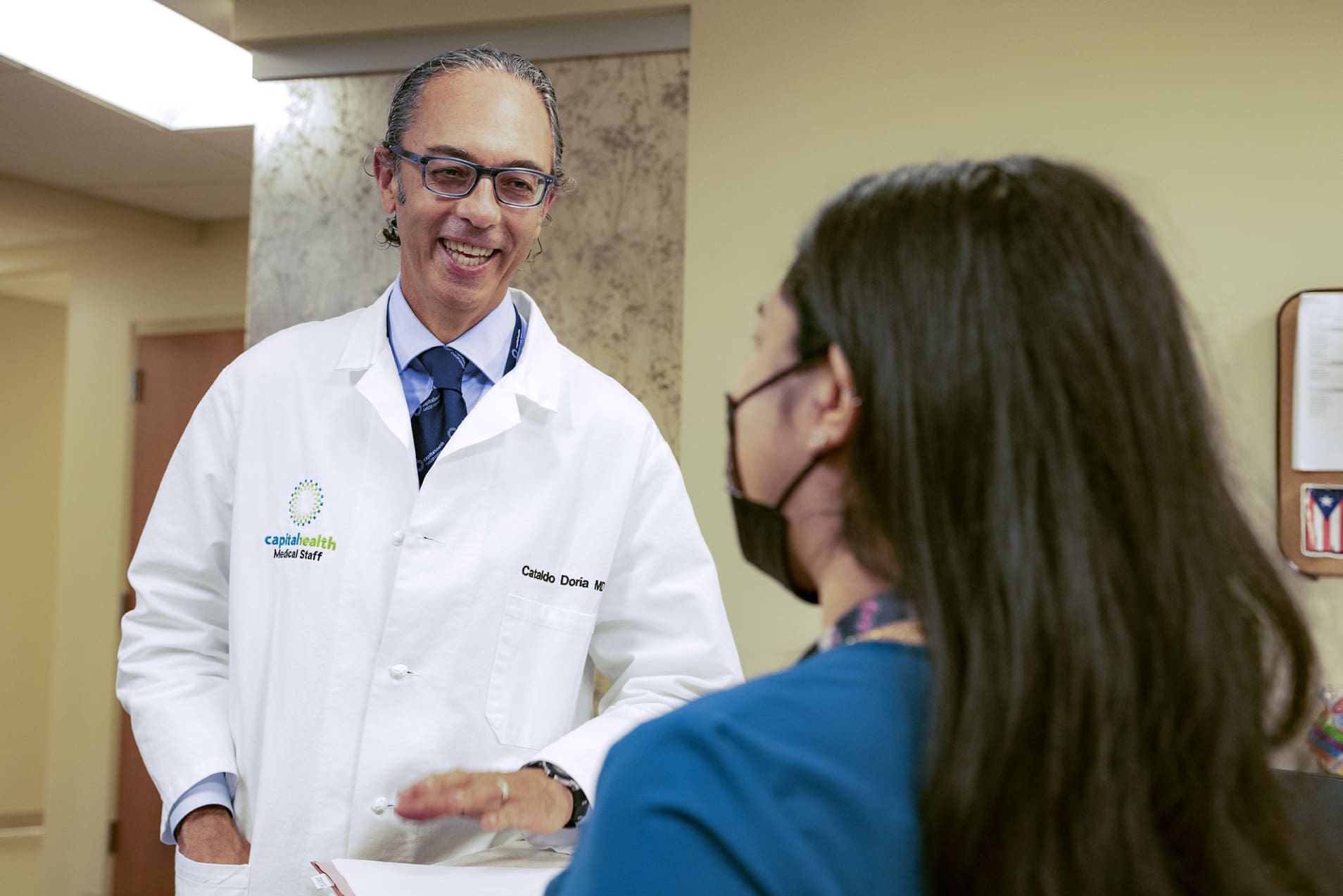
After a pancreatic cancer diagnosis, patients naturally want to know what treatment options are available to them. The single most effective pancreatic cancer treatment option is surgery. However, the type of surgery performed is based on where the cancer is located.
One particular complex and technically demanding surgery, called a pancreaticoduodenectomy, is one of the surgeries used for long-term control of pancreatic cancer. More commonly referred to as the Whipple procedure, this surgery may extend the person’s life and, for some, may be the best chance at a cure.
Surgery isn’t prescribed for every pancreatic cancer patient, however, and it’s typically offered only in specialized surgical settings, like the one you’ll find at Capital Health Medical Center – Hopewell. For more than a decade, the Capital Health Endoscopy Center at Hopewell has been recognized by the American Society of Gastrointestinal Endoscopy (ASGE) for being one of the best endoscopy units in the world with its Endoscopy Unit Recognition Program (EURP) designation.
If you or someone close to you has recently been diagnosed with pancreatic cancer, you’ve probably got a number of important questions about pancreatic cancer treatment options, including questions about the Whipple procedure and its recovery time. This article can help you find answers to those questions and much more.
What is the pancreas?
The pancreas is a gland about six inches long that sits in the back of the abdomen, behind the stomach. It plays key roles in producing enzymes and hormones that help digest food; it also produces insulin and glucagon to help regulate blood sugar levels.
Where is the pancreas?
The head of the pancreas is along the top of the abdomen and is connected through a small tube, the pancreatic duct, to the first section of the small intestine, which is called the duodenum.
What is pancreatic cancer?
Because the pancreas has a number of different cells, each can bring about a different type of tumor. The most prevalent is from the cells that line the pancreatic duct, and often there are very few to no symptoms. There are some, however, you should be aware of, and include:
- Loss of appetite or unintended weight loss
- Abdominal pain that radiates to your back
- Light-colored stools
- Dark-colored urine
- Jaundice (yellowing of the skin)
- A new diabetes diagnosis, or existing diabetes that’s become difficult to control
- Nausea or vomiting
What is the Whipple procedure?
You might be wondering, what is a Whipple? The Whipple procedure was named for Dr. Allen Whipple, an American surgeon who came up with an improved version of this surgery in 1935. He based it off of a much earlier surgery performed by Italian surgeon Dr. Codivilla in 1898.
The Whipple procedure involves removing the head, or the wide part, of the pancreas next to the first part of the small intestine, called the duodenum. Then, the duodenum, some of the common bile duct, the gallbladder and possibly some of the stomach are all removed. Once that’s done, the surgeon reconnects the remaining intestine, bile duct and pancreas. It’s currently one of the only surgeries that can offer a potential cure for pancreatic cancer.
Who is a good candidate for the Whipple procedure?
Determining the right type of surgery for pancreatic cancer is largely based on the tumor’s location. The Whipple procedure is considered for tumors located at the head of the pancreas that have not spread to other parts of the body.
What is recovery like for the Whipple procedure?
Every person responds differently to surgery, and it depends on how it is performed. For a Whipple procedure performed as traditional open surgery, a patient generally takes about 4 weeks to reach complete recovery. This type of surgery generally requires a hospital stay of about 4 days, though this varies from person to person.
Specially trained surgeons are able to offer a minimally invasive option through the da Vinci Surgery System robotic-assisted Whipple procedure. This approach reduces recovery time for patients.
Your surgeon will want you to be up and walking almost immediately after surgery to reduce the risk of blood clots or a pulmonary embolism. The amount of food you can eat at one time and how your body handles food may undergo a change.
Some recommendations to promote recovery from surgery include:
- Eating several smaller meals throughout the day instead of three larger ones
- Eating more slowly to ensure proper digestion
- Chewing your food very well
- Drinking plenty of hydrating fluids
- Avoiding foods and fluids that cause gas
- Including a dietary source of protein each time you eat
Are there common complications to this surgery?
As with any surgery, there can be complications, which may be minor or major. Those include bleeding, infections, clots, pneumonia or heart attacks. They can also include trouble with the stomach emptying itself after meals.
Your surgeon should be able to manage most of these complications without the need for another surgery.
Who should perform the Whipple procedure?
As mentioned before, the Whipple procedure is a complex and technically demanding surgery. However, our extensively trained surgeons here at Capital Health are certified and experienced at such a high level that the National Pancreas Foundation has recognized us as a Center of Excellence for treating pancreatic cancer-related illnesses.
Patients who are good candidates for the Whipple procedure should choose a surgeon who has extensive experience with this type of surgery and has performed numerous Whipple procedures. Patients should also select a hospital large enough to care for Whipple procedure patients post-operatively, and are used to managing any post-surgery complications.
What hospital has the best pancreatic treatment center?
You may want to know about where you can find the area’s best pancreatic cancer treatment center, though that answer will certainly differ from person to person. It may help to talk with your doctor and other members of your health care team, and ask them questions about how many procedures a surgical team has conducted and what technology they are trained in. You may also want to ask them how they feel this surgery will affect things like your quality of life.
We know that the decision to select a surgical team is a very important one. At Capital Health, we’re here to help you. If you’d like to make an appointment, please call us at 609-537-5000, or visit CapitalHealthCancerCenter.com.


